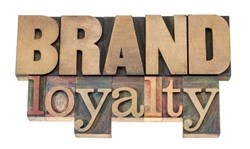
Top stories






More news

ESG & Sustainability
#AGES2026: How to back Africa's next-gen green and blue entrepreneurs


















Logistics & Transport
#Budget2026: Road freight logistics and what it means for consumers


The picture of fanatically loyal consumers doing anything for their brand of choice has become particularly attractive to marketers since the evolution of everything digital. The fact that consumers now have way more power over the brand conversation makes the idea of loyal ambassadors spreading our brand's praises far and wide highly appealing. But perhaps the reality of this idea needs some testing.
Think about the last time you bought a chocolate bar. In your split-second decision, your mind probably went through a number of subliminal options of brands it considered and those it rejected or ignored.
If I buy a chocolate, it's generally going to be a Tex, Kit Kat, Nosh or Smarties. I generally don't look or think beyond that repertoire. I am extremely loyal, but I'm loyal to a repertoire of brands in any category, rather than being exclusively loyal to one.
Let's take a more complex category like cars. A consumer has, or develops, a repertoire of brands that they consider when buying a new car.
So I may be considering a purchase between a VW, Toyota or Hyundai, and I end up buying the Toyota. But in three years' time when it comes to buying another car, this doesn't mean that I will necessarily choose a Toyota again. I will look within my repertoire at options that appeal to me, and my selection may shift over time. Eventually I may migrate into a different repertoire, such as the luxury car market, or SUVs, but I generally have a defined group of brands that I will consider, and others that I will ignore or reject.
And when I've bought my car, I'll generally fill it up at an Engen, Shell or Sasol. For some reason, I tend to bypass a Total or a Caltex - I don't know why, but they just don't seem to appeal to me - unless I'm running on empty and I'm forced to put practicality before gut emotion.
When I get home at night, I slip on my adidas tracksuit and my Nike takkies, and if I'm in for a night of TV viewing, I tend to stick to my seven-odd channels of choice on DStv rather than flicking randomly through the whole enchilada. Yes, I'll occasionally flick to some arb channel to see what's on, but generally, I have my personal bouquet. Of course I prefer some channels within my repertoire more than others, but the point is that I'm not exclusively loyal to one.
By the way, I'm not in any way unique. If my particular examples don't resonate with you, I'm sure that others will. And it's not just an upper LSM thing. According to research by the Ehrenberg Bass Institute of Marketing[1] - the largest marketing institute in the world - this is a universal 'rule' of consumer buying behaviour. When the EB guys look across multiple different categories, across different markets, consumers and time, they see the same trends. In the vast majority of cases, consumers are not exclusively loyal to a brand, they are loyal to a repertoire of brands.
So hypothetically if Clover[2] is losing share to B label brands, it's not because consumers are converting to B labels. It's because they are buying more of the B labels than they used to, within their repertoire. They still prefer Clover and they would probably still be buying more Clover if they could afford to, but their 'mix' is shifting.
Which gets us to an interesting point. If consumers generally don't just buy one brand, but rather three or four depending on category specifics, then the idea of 'converting' consumers needs to be challenged.
Perhaps the idea of 'continuous nudging'[3] needs to be considered, rather than 'converting'. And it's an important distinction.
If you have a 'conversion' mindset as a marketer, you're more likely to believe in one-off advertising or promotional campaigns. Once you've successfully 'converted' your prospect, the job is done, right?
If, however, you believe that 'your' consumers will continue to buy other brands besides yours, then the idea of 'nudging' makes sense.
The EB guys will tell you (based on empirical evidence rather than thumb suck) that the most important factor driving purchase is one of brand salience (not to be confused with brand awareness). Brand salience is the degree to which your brand is thought about or noticed when a customer is in a buying situation. And not surprisingly, big successful brands have high brand salience whereas unsuccessful brands have little, or none.
What brand salience requires is an 'always on' mindset, rather than a typical campaign 'burst' strategy. Burst = converting, drip = nudging. But ideally you want a bit more of a steady hosepipe than a trickle, to make sure that when the consumer is in the market for the category, your brand is top of mind. Ask Steve[4].
Yes, of course this requires that you increase your marketing budget, but if you don't believe that communication has any effect on sales than you should probably put everything to the bottom line anyway - and crawl back into that dark hole of brand anonymity.
At this stage, it may be worthwhile revisiting the point made in the intro to this piece.
The vast majority of consumers are not posting pictures of their last experience with your brand on your Facebook page. In fact, they are not thinking about you that often, or at all. Those weirdoes who have your brand tattooed on their chest are in the very small minority, and are at best, actors[5] in your play, rather than the audience.
Most consumers are light buyers[6], and even if they are buying your brand, they are buying from your competitors' too. The best you can do is to constantly keep your brand as salient as possible, so that they will buy more of you than others, or that non-buyers may substitute a competing brand with yours in their repertoire.
[1] Apologies to Ehrenberg Bass, for referring to them from now on as 'the EB guys', to save a little ink.
[2] Apologies to Clover - I have no idea whether they have any market share issues as I have never worked with Clover or on the dairy category at any stage in my career. And to be honest I'm pretty blind to prices when I shop (my bad), so I have no idea where they sit in the pricing spectrum.
[3] Apologies to Richard H. Thaler and Cass R. Sunstein, who wrote one of the great books on behavioural economics, called, wait for it, Nudge.
[4] Apologies to FNB, and to all those who will tell me how irritating Steve is, and how the campaign is now beginning to backfire, blah, blah.
[5] Apologies for not knowing who first used this analogy, as many articles have been written expounding on this theme. I just happen to agree.
[6] A topic for another day.
